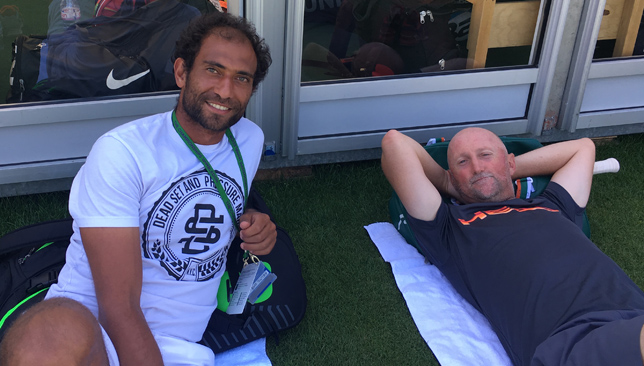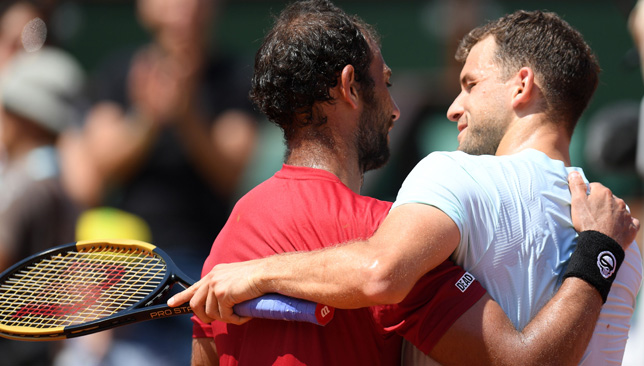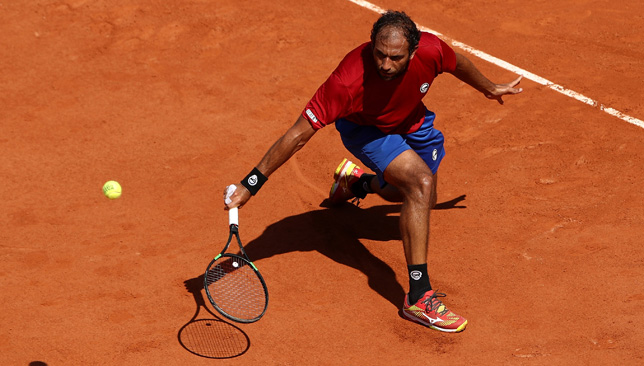
Mohamed Safwat has a simple yet effective formula that is helping him make history for Egypt with every new milestone he hits on the tennis court: Keep your head down, stay hungry, don’t expect too much but always aim for more.
Barely a month after becoming the first Egyptian since 1996 to contest a Grand Slam main draw at Roland Garros, Safwat won his qualifying first round on Monday, 6-4, 6-4 over British wildcard Jack Draper, in an attempt to become the first player from his nation to play at Wimbledon since Ismail El Shafei in 1980.
Two years ago, on the same courts at Roehampton where the Wimbledon qualifying event is staged, Safwat came ever so close to qualifying for the All England Club showpiece but fell in the final round.
“It was a good experience for me, it was the first time in my life ever to play grass,” the 163rd-ranked Safwat told Sport360, reflecting on his 2016 Wimbledon qualifying journey.
“I was kind of loose, I didn’t expect too much. I feel now it’s different because I had my best Grand Slam result on grass [at the time], I qualified for an ATP 250 event and I won a round [in Antalya 2017], so if I look at it, my best results are on grass.

Mohamed Safwat falls to Grigor Dimitrov on his historic Grand Slam debut at Roland Garros
“It was a surprise to me but I’m trying not to be in the mindset where I’m taking everything for granted. If I don’t work for the things, they won’t come. If I said ‘yes, this is my best result, I made the final round in qualifying here before’ – and I was really aware of this before I came here and that was my challenge, to be in the right mindset all the time because if I go like ‘I feel good on grass, I play well here’…
“I’m not a grass specialist, okay I play well on it but I’m no specialist. But I try to fight. I try to make it hard for the other guys. Qualifying is a real fight. And if I think ‘everything is under control, everything is fine, I will manage to get here’ I won’t fight. I think for me this is my strength, fighting and accepting what’s happening and keeping on.”

At the same time as Egypt were losing to Saudi Arabia to exit the World Cup with three defeats from as many games in Russia, Safwat was battling Draper on court to set up a Wimbledon qualifying second round against American Michael Mmoh (taking place on Tuesday).
While Egypt’s first World Cup appearance since 1990 ended in heartbreak, Safwat has an opportunity to give his country reason to celebrate.
But if his achievements are causing a stir back home, the 27-year-old insists he is not really aware of it, as he tries to block any external distractions and not give too much weight to his historic feats.
“I wasn’t trying to get involved in anything,” he said when asked if had an idea of how Egypt reacted to his Roland Garros debut last month.
“It’s a fact, that whatever I do, everything is new and if I get this feeling that, ‘okay, I’ll be satisfied with what I achieved’, then I don’t think I will be willing to work and I will be willing to progress more. So I’m just trying to look at where I want to go.”
He feels Egypt’s World Cup woes stemmed from the immense pressure the team were under, especially with Liverpool star Mohamed Salah spearheading the squad.
“My thought is that people were expecting too much from them, there was too much pressure on them. I heard there were scores of celebrities going to their hotel the night before the matches, that’s too much pressure for a player, especially that they qualified for the first time in 28 years and everyone was expecting them to do well because they have Salah, one of the best players in the world,” said Salah of Egypt’s failings in Russia.
“We had a good group as well so the expectations were pretty high. The players were under too much stress and this is a culture thing. This is the mentality of many Arabs. Too much expectation, too much stress, the ‘Pharaohs’, this and that… just let them play, and when they win let’s celebrate. I think that’s what is stopping Arabs in many sports to go big.”
Despite having no grass-court matches under his belt heading into Roehampton, Safwat was pleased with his opening win over Draper.
“It’s always the first round that has a different feeling. He is young, motivated to play to justify his wildcard. I didn’t know much about him,” confessed the Mansoura-native.
“I was just trying to look for him on the internet, trying to find any videos of him playing and finally found one match. So I didn’t have much info about him. I believe he’s used to play on grass more than I do. I just needed to be aware at the beginning, be focused, give him a message that it’s going to be tough, that it wasn’t going to be easy for him.”
He added: “I always feel good on grass. I have the experience and I adapt quickly on it so it wasn’t a big problem to switch from clay to grass. The first practice, it was tough for me to move, and I was struggling a bit with the movement but I did some exercises, I have my coach with me here, so I adapted quickly.”